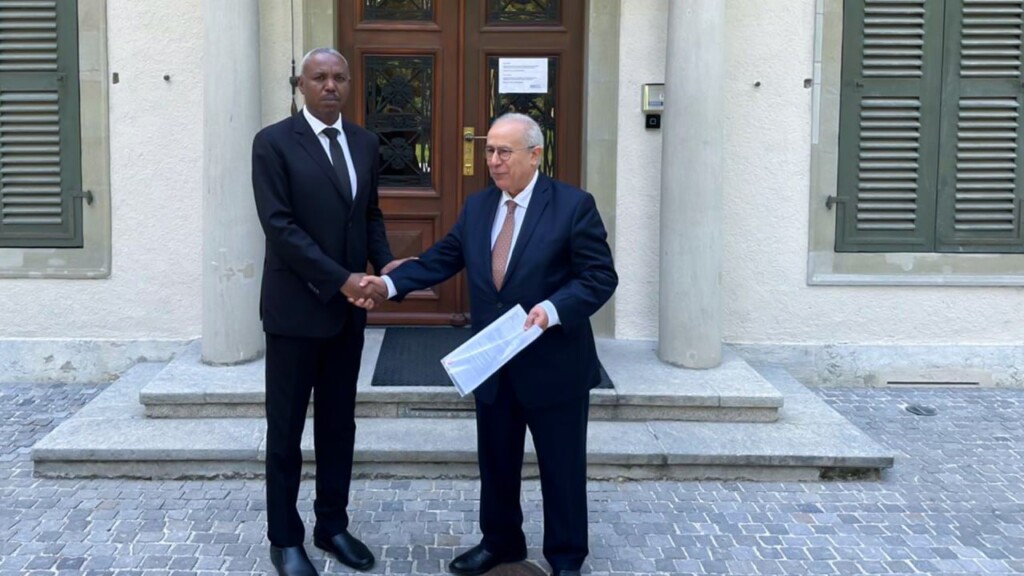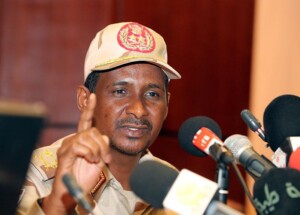Sudan’s RSF ‘ready for a ceasefire’, says top negotiator

Head of the RSF negotiation team, Brig Gen Omar Hamdan (left) with Ramtane Lamamra, the UN Secretary-General's Envoy to Sudan, after negotiations held in Geneva, Switzerland, in July (Photo: RSF website)
The negotiating delegation of Sudan’s Rapid Support Forces (RSF) held a press conference in Kenya this morning. Brig Gen Omar Hamdan, head of the delegation, and Ezzeldin El Safi, the RSF legal advisor, outlined their position on the war, peace talks, and relations with neighbouring Egypt.
In a press conference in Nairobi, the capital of Kenya, RSF negotiation lead Brig Gen Hamdan and RSF legal advisor El Safi reiterated the RSF’s “commitment to an immediate and comprehensive ceasefire” to facilitate the delivery of humanitarian aid across Sudan. El Safi accused the Sudanese Armed Forces (SAF) of undermining peace efforts, describing their stance as one that seeks “either military victory or the destruction of Sudan”, and pointed the blame at the army for starting the ongoing war.
Hamdan blamed the SAF leadership for the failure of multiple peace initiatives, including the Jeddah platform, the Intergovernmental Authority on Development (IGAD) initiative, and meetings in Manama. He emphasised the need to build a “unified national army”, accusing the SAF of devolving into a “coalition of militias lacking professional standards such as political neutrality and accountability”.
The negotiation head denied allegations that the RSF had rejected integration into the national army before the war, claiming that their position was consistent with the framework agreement. Observers interpreted the RSF’s statements as a potential softening of their previously hardline stance, which prioritised military options over negotiations.
Civilian casualties
Legal advisor El Safi accused the Sudanese and Egyptian air forces of killing 2,373 civilians in air strikes over the past two months, presenting alleged evidence, including video clips and statistics. Radio Dabanga was unable to obtain immediate comment from the Sudanese or Egyptian governments.
On alleged human rights violations in El Gezira, El Safi attributed the deaths to cholera and other diseases, dismissing claims that RSF forces were responsible. He noted, however, that RSF personnel implicated in abuses in Khartoum, El Gezira, and Darfur had been “tried”.
The RSF expressed dissatisfaction with Egypt’s role in Sudan, accusing Cairo of supporting Islamist factions while rejecting the Muslim Brotherhood domestically. El Safi criticised Egypt’s involvement in printing Sudanese currency, supporting air strikes, and exploiting Sudanese resources.
“We respect the Egyptian people,” El Safi said, “but the El Sisi government continues to support the rule of Islamists in Sudan, so we have activated economic measures against it.”
The RSF emphasised that they maintain no hostility towards Egypt or any other nation, and denied allegations of receiving external military support from countries such as the UAE. “We rely on our own resources and control 70 percent of Sudan’s territory, including significant arms reserves,” the legal advisor said.
Economy
Regarding the Port Sudan government’s decision to change certain banknotes, the RSF called it “part of a plan to divide the country”. They announced that RSF-controlled areas would “continue using the dollar and older currency notes”.
The RSF delegation concluded by aligning themselves with pro-democracy civilian groups, such as the Civil Democratic Forces alliance (Tagadom), advocating for an end to the war and a transition to civilian rule.
Radio Dabanga continues to seek responses from the Sudanese and Egyptian governments regarding the RSF’s allegations.











 and then
and then